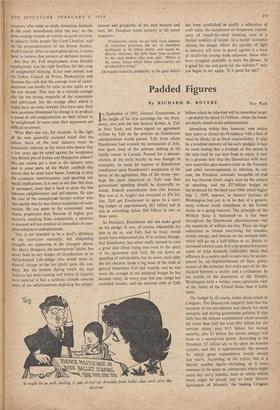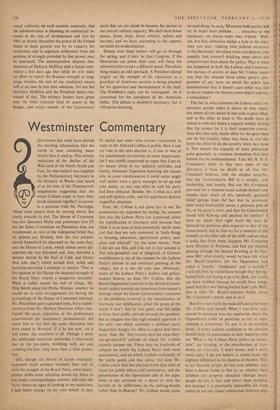Padded Figures
By RICHARD TN September of 1952, General Eisenhower, at 'the height of his first campaign for the Presi- dency, met with the late Senator Robert A. Taft in New York, and there signed an agreement written by Taft on the policies an Eisenhower administration would pursue. Taft, from whom Eisenhower had wrested the nomination in July, had spent most of the summer sulking at his family retreat in Canada. Pressed for a demon- stration of the party loyalty he was thought to exemplify, he made his support of Eisenhower conditional upon Eisenhower's acceptance of the terms of the agreement. One of the terms—per- haps the most important to Taft—was that government spending should be drastically re- duced. Federal expenditures then (the Korean War was at its height) had mounted to $74 bil- lion. Taft got Eisenhower to agree to a start- ing budget of approximately $65 billion and to aim at something below $60 billion in two or three years.
As President, Eisenhower did not make good on his pledge. It was, of course, impossible for him to do so, and Taft, had he lived, would surely have understood this. It is curious, though, that Eisenhower has never really seemed to care a great deal about being true even to the spirit of his agreement with Taft. He cut down on spending of certain sorts, but he never, until after the last election, made a big issue of the kind of general reductions Taft had wanted, and he was never the evangel of the balanced budget he has become today. In every year but one, outgo has exceeded income, and the national debt of $266 billion which he inherited will be somewhat larger —probably by about $15 billion—when the books are finally closed on his administration.
Something within him, however, now makes him yearn to climax his Presidency with a feat of what he thinks of as fiscal responsibility. It may be a troubled memory of his early pledges; it may be some feeling that a triumph of this nature is the only kind he can now hope to enjoy; it may be a genuine fear that the Democrats with their new majorities plan massive raids on the Treasury and other encouragements to inflation. In any case, the President, normally incapable of true ire, has become God's angry man on the subject of spending, and the $77-billion budget he has proposed for the fiscal year 1960, which begins July 1, 1959, appears, as Senator Jackson of Washington had put it, to be that of a govern- ment without much confidence in the United States as a going concern. The principle of the Welfare State is honoured—as it has been throughout the Eisenhower administration—but the standards of welfare are low. There are huge reductions in almost everything but missiles, atomic energy, and interest on the national debt, which will go up a half-billion or so, thanks to increased interest rates. It is a six-pound documen- tation of John Kenneth Galbraith's thesis that affluence in a society such as ours may be accom- panied by an impoverishment of those public . sectors of the economy that make part of the dis- tinction between a society and a civilisation. In the middle of the depression of the Thirties, Washington held a bolder, more optimistic view of the future of the United States than it holds today.
The budget is, of course, under sharp attack in Congress. The Democratic majority feels that the mandate of the last election was clearly for more energetic and daring government policies. It also feels that the defence expenditures which account for more than half the total ($41 billion for the services alone, plus $3.5 billion for mutual security, plus $3 billion for atomic energy) will leave us a second-rate power. According to the President, $7 billion are to be spent on missiles systems, and this is approximately the amount by which gross expenditures would exceed last year's. According to his critics, this is a heavily padded figure—including, as it does, amounts to be spent on submarines which might some day carry missiles, land on which missile bases might be placed, and so forth. Senator Symington of Missouri, the leading Congres- sional authority on such matters, maintains that the administration is planning no substantial in- crease in the rate of development and that by 1961 or shortly thereafter the power of the United States to deter general war by its capacity for retaliation, and to negotiate settlements from the position of strength provided by that power, may be destroyed. The administration disputes this; Secretary of Defence McElroy told a Senate com- mittee a few days ago that while we will make no effort to match the Russian strength in long- range missiles, the sum of our retaliatory means will at no time be less than adequate. No one but Secretary McElroy and the President seems con- vinced of this. The military leaders have given only the most reluctant kind of assent to the budget, and critics outside of the Government insist that 'we are about to become far poorer in our overall military capacity. We shall have fewer planes, fewer ships, fewer soldiers, sailors and marines, and we have, according to the experts, no funds for modernisation.
Debate over these matters will go on through the spring, and it may be that Congress, if the Democrats can prove their case, will force the administration to take a different stand. The whole thing makes an odd spectacle. A President elected largely on the strength of his reputation as a guardian of American security is being attacked for his ignorance and incompetence in the field. The President's reply can be anticipated : he is concerned for the soundness of the American dollar. The debate is doubtless necessary, but it will not be elevating.







































 Previous page
Previous page